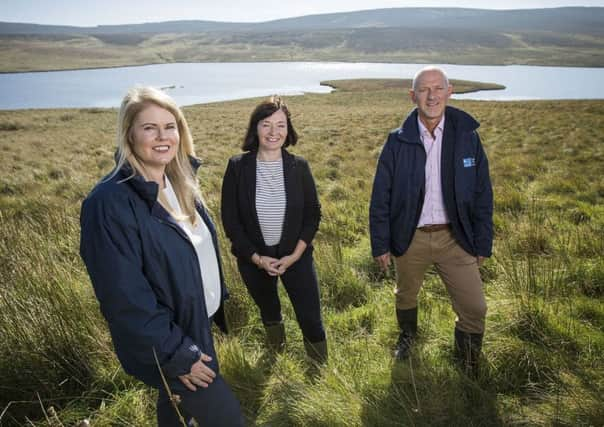Garron Plateau Bog Restoration is a win, win


The objective of this work was to restore the blanket bog to its former glory, improve water quality and encourage the native wildlife that used to live there to return.
The Co-operation Across Borders for Biodiversity (CABB) project, supported by the European Union’s INTERREG VA Programme and managed by the Special EU Programmes Body (SEUPB), is a €4.9m (£4.3m) project being delivered through a partnership between RSPB NI (the lead partner), RSPB Scotland, BirdWatch Ireland, Butterfly Conservation, Northern Ireland Water and Moors for the Future. The project will see 2,228 hectares of blanket bog being restored across the three countries.
Advertisement
Advertisement
Roy Taylor, NI Water Catchment Manager says: “During the 1960’s and 1970’s this land near NI Water’s Dungonnell Dam was damaged when drainage ditches were dug through the bog. Combined with overgrazing by livestock, the peat was exposed, causing it to erode and dry out. This resulted in the supply of poor quality, peat-rich raw water to Dungonnell Reservoir and increased costs during the water treatment process to remove the colour from the water. With the exposure to the elements, the bog lost its natural ability to store water. This project aims to restore the bog to naturally filter the water and also provide a vital wildlife habitat.”
The project has already been awarded a prestigious “Green Apple Environment Award’ for its work with Lowry Building & Civil Engineering, who helped to install a number of dams for NI Water, as part of the resation of Garron Bog.
NI Water, working with the RSPB and NIEA, have reversed the damage caused to the bog using an innovative method; instead of draining water away to prevent flooding, in this project, drains were deliberately blocked to raise the water levels. As a result of blocking drainage ditches, raising water levels in the peat, the bog has been recreated and pools have formed throughout the area, giving the ideal conditions for sphagnum mosses to grow. The moss and peat naturally filters the water and this natural filtration process can then reduce the amount of chemicals NI Water need to use, to clean the water.
NI Water, working with the assistance of the RSPB and NIEA started drain blocking back in 2013 and continued the work through the CABB project in 2018 & 2019. Joanne Sherwood Director of the RSPB in Northern Ireland says: “The blanket bog is home to protected birds of prey including the hen harrier and rare plants such as bog orchid. The blanket bog restoration, through drain blocking and implementation of actions within a Conservation Action Plan, is not only a win for NI Water in terms of raw water quality, but it is also a win for the environment, creating an improved habitat for wildlife.”
Advertisement
Advertisement
Designated as an Area of Special Scientific Interest (ASSI), a Special Protection Area (SPA), a Special Area of Conservation (SAC) and Wetland of International Importance (WII), the win for customers in the area is better water quality in the County Antrim homes that nearby Dungonnell reservoir supplies.
Roy Taylor, Catchment Manager for NI Water says: “The Integrated catchment approach is now widely regarded as a viable alternative to costly ‘bricks and mortar’ capital projects and has been widely adopted by water companies across the UK. It has proved to be a sustainable and cost effective option when compared to dealing with water quality issues at the treatment works. This is the first project of this type undertaken by NI Water and the success so far is as a result of excellent cooperation between a number of agencies along with NI Water, through the Sustainable Catchment Area Management Planning (SCaMP) programme. Removing pollutants at water treatment works involves using costly chemicals and our aim is to help improve land management so that water quality and quantity is improved at source, long before it reaches our works.”
It is envisaged that the work undertaken at Dungonnell will serve as a demonstration site for best practice and serve as a model for future bog restoration projects in Northern Ireland and beyond.